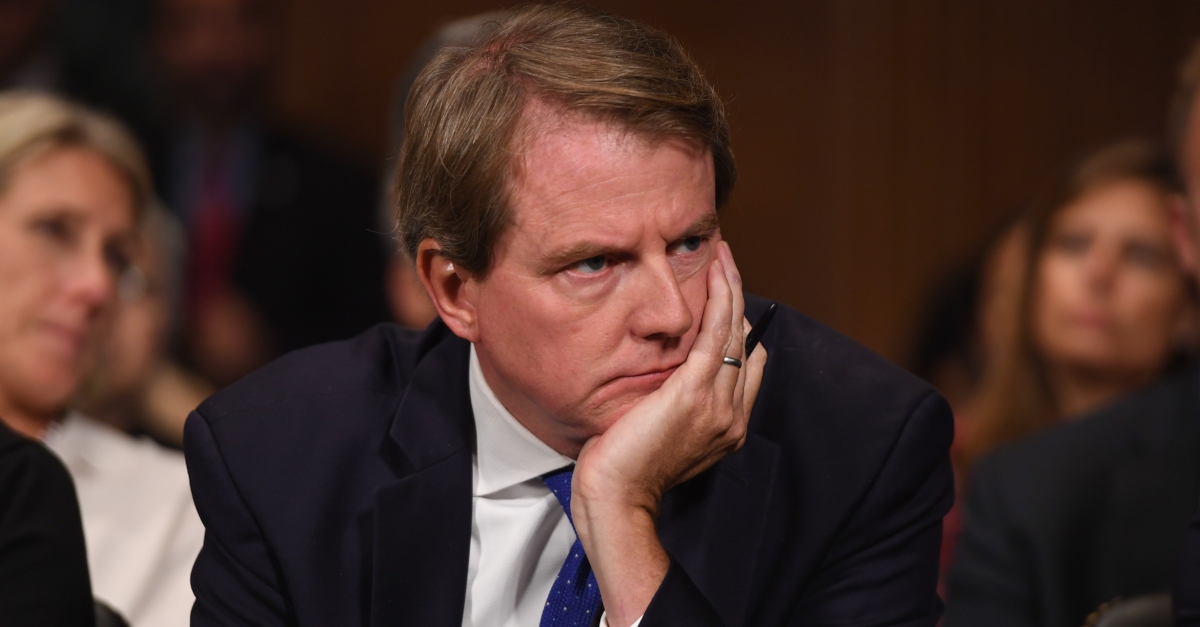
A federal judge has ruled that President Donald Trump‘s former attorney Don McGahn must testify before the U.S. House of Representatives as part of the ongoing impeachment probe. The judge found that if she didn’t rule as she had, this would send the country on a path toward “tyranny.”
U.S. District Judge Ketanji Brown Jackson issued a 120-page ruling which determined that Congress issued a duly-authorized subpoena and that McGahn must comply. The opinion also had some harsh words for Attorney General William Barr‘s highly politicized Department of Justice (DOJ).
“[W]hen DOJ insists that Presidents can lawfully prevent their senior-level aides from responding to compelled congressional process and that neither the federal courts nor Congress has the power to do anything about it, DOJ promotes a conception of separation-of-powers principles that gets these constitutional commands exactly backwards,” Brown Jackson notes.
The scorching decision didn’t stop there:
In reality, it is a core tenet of this Nation’s founding that the powers of a monarch must be split between the branches of the government to prevent tyranny. Thus, when presented with a case or controversy, it is the Judiciary’s duty under the Constitution to interpret the law and to declare government overreaches unlawful. Similarly, the House of Representatives has the constitutionally vested responsibility to conduct investigations of suspected abuses of power within the government, and to act to curb those improprieties, if required. Accordingly, DOJ’s conceptual claim to unreviewable absolute testimonial immunity on separation-of-powers grounds–essentially, that the Constitution’s scheme countenances unassailable Executive branch authority–is baseless, and as such, cannot be sustained.
The McGahn subpoena battle has steadily progressed in a near-certain direction since late Spring of this year.
On April 22, the House Judiciary Committee issued McGahn a subpoena to produce various documents by May 10.
On May 7, White House counsel Pat Cipollone, sent a letter to McGahn’s attorney and House Judiciary Committee Chair Rep. Jerrold Nadler (D-N.Y.) which instructed McGahn not to comply with the congressional subpoena due to executive privilege claims.
“The subpoena seeks certain White House records provided to Mr. McGahn while was Counsel to the President that are related to Special Counsel Robert S. Mueller, III’s investigation,” Cipollone noted. “The White House provided these records to Mr. McGahn in connection with its cooperation with the Special Counsel’s investigation and with the clear understanding that the records remain subject to the control of the White House for all purposes.”
McGahn took that advice. His attorney William Burck said:
The committee seeks to compel Mr. McGahn to produce White House documents the executive branch has directed that he not produce. Where co-equal branches of government are making contradictory demands on Mr. McGahn concerning the same set of documents, the appropriate response for Mr. McGahn is to maintain the status quo unless and until the committee and the executive branch can reach an accommodation.
On May 14, House Democrats warned McGahn that he not only had to comply with the document request subpoena but that his testimony would required as well–or that he would be held in contempt of Congress.
On June 11, the House voted 229-191 to hold both McGahn and Attorney General Barr in civil contempt of Congress over their efforts to stonewall congressional impeachment inquiries.
Progressive Rep. Jamie Raskin (D-Md.) summed up the mood of the House, saying that Congress “cannot tolerate a posture from the president of the United States … of noncooperation — of absolute, comprehensive, wholesale defiance of the will of a Congress trying to seek information.”
On August 7, House Democrats filed a lawsuit in the U.S. District Court for the District of Columbia seeking to compel McGahn’s cooperation with both the document production request and their demand that he testify about his knowledge of–and alleged activities during–Mueller’s Russia probe.
Brown Jackson previously signaled she would rule in the House’s favor during oral arguments in October.
The judge’s Monday decision, though expected, was especially caustic toward Trump’s White House and Barr’s DOJ.
“The United States of America has a government of laws and not of men,” Brown Jackson concludes.
The ruling was effusively welcomed by liberal advocacy group People for the American Way (PFAW).
“This ruling comes as a timely reinforcement of our constitutional principles of separation of powers and checks and balances, which have been under relentless assault by the Trump administration,” said PFAW’s Executive Vice President for Policy and Program Marge Baker in a statement. “It affirms the common-sense principle that Congress’s power to subpoena the executive branch is essential to fulfill its duty of oversight. This ruling means not only that McGahn must provide testimony, but so must a raft of administration officials who have been stonewalling Congress in attempts to protect this president. Their failure to comply leaves congressional investigators no option but to assume that their testimony, if delivered, would incriminate the president who is ordering them not to testify.”
Judiciary Cmte v. McGahn by Law&Crime on Scribd
[image via via Saul Loeb-Pool_Getty Images]